BC Museums Association Strategic Plan
Setting a bold direction for 2024-2029
Contents
Advance Justice, Equity, Diversity, and Inclusion
Ensure the Sustainability of Our Sector
Financial support for the 2024 Governance and Leadership Symposium and 2024-2029 Strategic Plan was provided in part by the Canada Council for the Arts and the Vancouver Foundation.


BCMA Strategic Plan: Setting a bold direction for 2024-2029
The BCMA 2024-2029 Strategic Plan is available as a downloadable PDF.
Introduction
Founded in 1957, the British Columbia Museums Association (BCMA) supports a thriving arts, culture, and heritage sector through collaboration, networking, advocacy, innovation, and professional development.
Since our founding, the BCMA has grown to include more than 450 members in every corner of British Columbia including museums, art galleries, science centres, Indigenous cultural organizations, First Nations, heritage sites, botanical and zoological gardens, cultural centres, conservation institutes, grassroots arts organizations, exhibition galleries permanently maintained by libraries and archives, and nature reserves.
The BCMA supports the professionals and volunteers who work in BC’s cultural sector and we aim to improve the cultural literacy of all British Columbians. The BCMA collaborates with arts, culture, and heritage partners to engage with all levels of government to share stories and make them aware of the true impact our sector has in communities large and small across the province.
A Council elected from our membership governs the BCMA. Council members listen to the broader community and help set policy and strategic priorities for the Association, while services are delivered by a dedicated staff and network of professional support. The BCMA is a provincially incorporated society and a registered charity.

About the Plan
A Strategic Plan is meant to answer the questions: Where are we going and how will we get there? The BCMA Strategic Plan is grounded in the ambitions shared by our members, leadership, and staff. It is a living document meant to prioritize key activities and resources over the next three to five years. In this plan, we have developed a vision and mission statement to guide our collective efforts.
A vision statement provides direction and a sense of purpose. A mission statement describes who we are, our goals, and how we aim to achieve them.
Organizational values will serve as the standard for guiding the work of the BCMA. By having strong values in place, we create a culture of accountability and trust by setting out the appropriate behaviors needed for success.
Within the scope of this Strategic Plan, we have identified five priorities that, given our current and expected resources, we believe we can make significant progress on within the next three to five years. The priorities are broken down into goals with specific actions that we will prioritize over the coming years.
The details of how these priorities will be implemented will be developed in an annual operating plan and budget developed by BCMA staff and presented to the BCMA Council for approval. Progress, successes, and challenges will be presented to our members in annual reports and at our annual general meeting.
The Strategic Plan will be implemented by all levels of our organization and reported out on regularly. This is meant to be a living document and our priorities may change as circumstances evolve. Given the rapid and often unpredictable changes of the past three years, it is difficult to forecast what the next five years will look like. To ensure that it remains relevant to the BCMA, our members, and the broader sector, it will be reviewed in conjunction with our annual planning cycle so that we can respond to the needs of, and the changes within our sector.
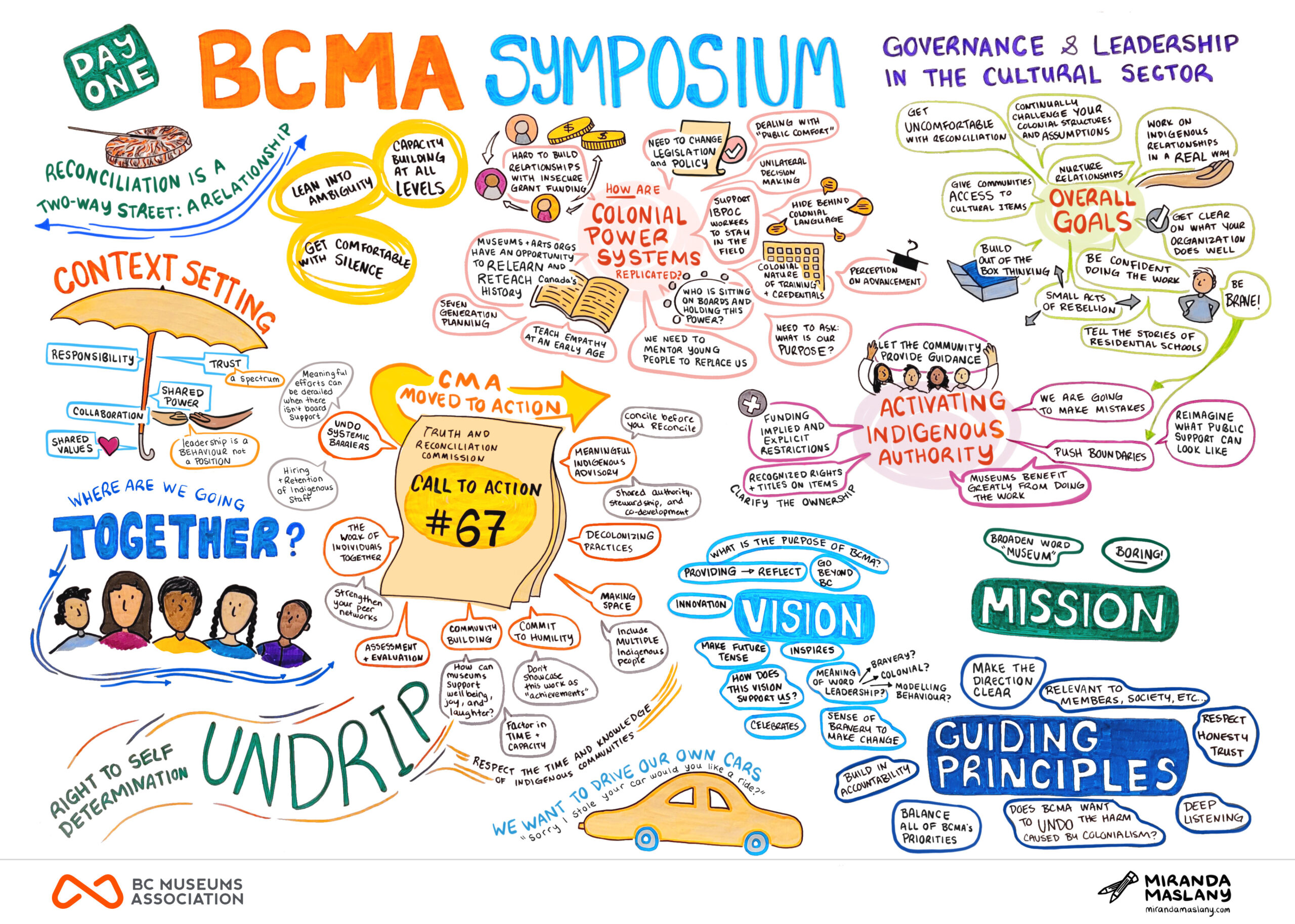
Image: Graphic record from the 2023 BCMA Governance Symposium Day 1
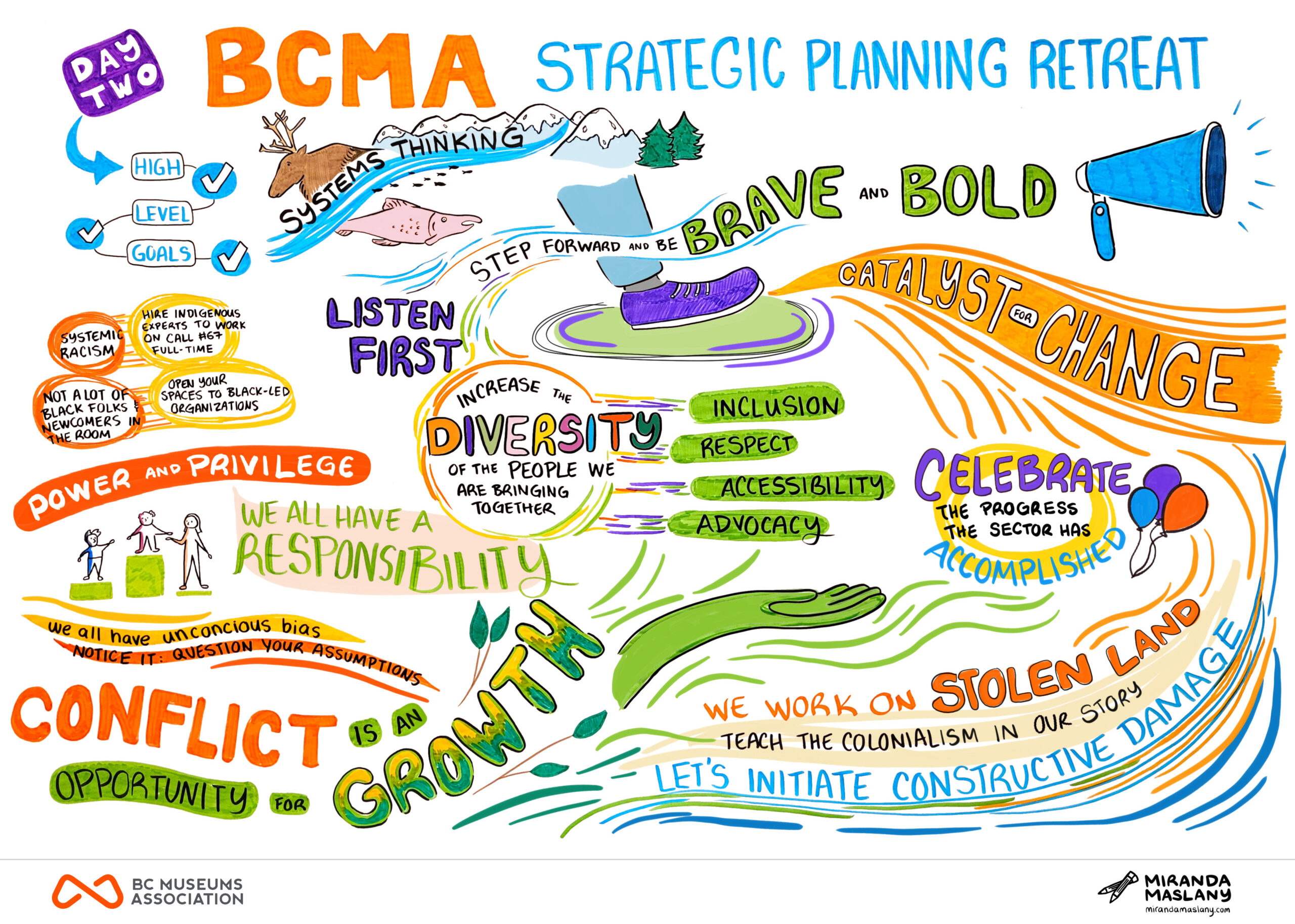
Image: Graphic record from the 2023 BCMA Governance Symposium Day 2
Our Vision
Create space for BCMA members to engage in meaningful, courageous dialogue, and equitable actions.
Our Mission
Through bold advocacy and collaborative leadership, the BC Museums Association supports the arts, culture, and heritage sector to thrive.
Our Values
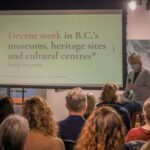 Accountability
Accountability
Accepting responsibility with integrity, transparency, and openness.
We hold ourselves accountable to the highest standards, fostering integrity, honesty, and openness as we learn from our past, embrace transparency, and fulfill our responsibilities.
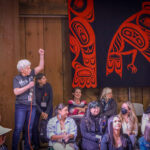 Bravery
Bravery
Using position, voice, and privilege to support a more just future.
We demonstrate bravery through fearless advocacy for the cultural sector, challenging the status quo, advancing reconciliation, and upholding the highest ethical standards.
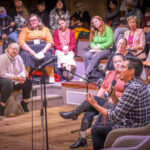 Equity
Equity
Listening to underrepresented voices and supporting social justice.
We advance equity by actively challenging norms, prioritizing diverse needs, listening to underrepresented voices, and fearlessly embarking on a collaborative journey guided by justice, diversity, and inclusion.
 Innovation
Innovation
Redefining what is possible to spark transformative change.
We embrace innovation by collaborating with emerging leaders, adopting sustainable practices, and pushing boundaries within the cultural sector. We re-imagine, create, lead, and champion non-traditional programming to spark transformative change.
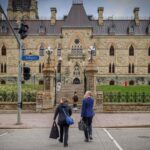 Relevance
Relevance
Demonstrating leadership within our community and the global cultural sector.
We strive for relevance by proactively engaging with communities, continuously adapting to their changing needs, and uplifting organizations that strive for progress, equity, and meaningful societal impact.
 Respect
Respect
Cultivating humility, listening deeply, honouring diverse voices.
We practice respect by humbly listening, adapting, and prioritizing relationships, creating safer spaces that amplify diverse voices, championing decolonial practices, and cultivating a culture of empathy and critical reflection.
Strategic Priorities
Priority 1: Advance Justice, Equity, Diversity, and Inclusion
Goal: Ensure that justice, equity, diversity, and inclusion are at the core of BCMA programs, policies, and decisions. Seek to collaborate with underrepresented communities to magnify our impact, sparking transformative change on a local level that is informed by a broader global context.
Priority 2: Ensure the Sustainability of Our Sector
Goal: Pursue and advocate for robust, diversified, and stable funding programs for the arts, culture, and heritage sector. Work with members and partners to explore revenue-generating initiatives and innovative business models.
Priority 3: Find Truth in Reconciliation
Goal: Actively work with Indigenous members and communities to challenge the harmful colonial foundations of our sector and co-create a new legacy built on truth, justice, equity, and respect.
Priority 4: Lead by Example
Goal: Model excellence in programs, relationships, practices, governance, and leadership. Share our own experiences and systems. Provide resources and services for member organizations to build their capacity.
Priority 5: Tell the Story of Our Sector
Goal: Share and celebrate stories of the impact of our members, clearly articulate the work of the BCMA, and advocate with all levels of government and the public to increase cultural awareness and literacy.

Priority #1: Advance Justice, Equity, Diversity, and Inclusion
Goal: Ensure that justice, equity, diversity, and inclusion are at the core of BCMA programs, policies, and decisions. Seek to collaborate with underrepresented communities to magnify our impact, sparking transformative change on a local level that is informed by a broader global context.
To advance justice, equity, diversity, and inclusion (JEDI) over the next five years, the BCMA will undertake the following key actions:
1. Funding and Advocacy
Advocate for funding opportunities that support JEDI-focused projects and positions in museums and cultural institutions, fostering a diverse and inclusive cultural sector.
2. Representation and Support
Promote equitable representation by actively working towards increasing the presence of historically underrepresented individuals (including but not limited to people with disabilities, IBPOC cultural professionals, 2SLGBTQIA+ individuals) in the BCMA and the sector, while providing dedicated support and resources for marginalized arts, culture, and heritage professionals and volunteers.
3. Learning and Outreach
Organize webinars, gatherings, and workshops that address JEDI topics, facilitate learning opportunities for the sector, and actively engage diverse presenters and facilitators to ensure a wide range of perspectives.
4. Equity and Support Systems
Advocate for equitable wages and decent working conditions for all arts, culture, and heritage professionals. Explore ways to develop systems within the BCMA to provide guidance and resources for individuals who are historically underrepresented in the sector or are facing workplace discrimination or harassment.
Collaboration and consultation with equity-seeking groups, such as the IBPOC Network, 2SLGBTQIA+ Network, and Indigenous Advisory Committee, will be prioritized to ensure that actions taken are relevant, effective, and respectful of diverse perspectives, ultimately fostering meaningful change within the BCMA and the wider cultural community.

Priority #2: Ensure the Sustainability of Our Sector
Goal: Pursue and advocate for robust, diversified, and stable funding programs for the arts, culture, and heritage sector. Work with members and partners to explore revenue-generating initiatives and innovative business models. Work with members and partners to explore revenue generating initiatives and innovative business models.
To ensure the sustainability of our sector over the next five years, the organization will undertake the following key actions:
1. Building Relationships and Trust
Establish strong connections and trust with relevant local, provincial, federal entities (governments, funders, and support organizations) to foster collaborative projects and ongoing reciprocally beneficial relationships. Advocate and partner with governments to secure funding that aligns with the Association’s five objectives.
2. Strategic Program Focus
Emphasizing long-term stability, the BCMA will strategically direct its programs towards initiatives that provide sustainable funding, avoiding reliance on temporary funding streams. This approach will ensure that projects undertaken are aligned with the BCMA’s mission and strategic goals.
3. Strengthening Support for Workers
Explore ways of providing more support for individuals working in our sector. This could include, but is not limited to, peer support networks, professional development training, mentorship, group health plans, information about wage and job stability, workers’ rights, and collective bargaining. By doing so, the Association will work towards ensuring fair working conditions, equitable benefits, and a stronger voice for its individual members.
4. Collaborative Advocacy
Collaborate closely with other provincial and territorial museum associations, and BC’s arts service organizations to advocate for consistent operational funding at both provincial and federal levels. This collaborative effort will especially focus on sustainable funding models for small museums and equity-deserving organizations that heavily rely on grants for their day-to-day operations.

Priority #3: Find Truth in Reconciliation
Goal: Actively work with Indigenous members and communities to dismantle the harmful colonial foundations of our sector and co-create a new legacy built on truth, justice, and equity.
To purposefully pursue the goal of dismantling the colonial foundations of the sector and co-create a new legacy, the BCMA will focus on the following key actions over the next five years:
1. Nothing About Us Without Us
Indigenous communities and organizations have the inherent right to exercise autonomy over decisions that impact their arts, culture, language, and heritage. Therefore, it is critical that the BCMA seek prior, informed consent from Indigenous partners before embarking on projects that concern Indigenous cultural heritage.
2. Decolonization Initiatives
Implement decolonization initiatives within the BCMA itself and within policies and legislation that impact arts, culture, and heritage. The BCMA aspires to challenge and transform existing practices, narratives, and structures to foster a more inclusive and equitable sector.
3. Increasing Representation of Cultural & Community Voices
Provide BCMA members with learning resources, training, and support on how to incorporate more cultural and community voices into work, exhibits, organizational structures, and programs.
4. Moved to Action
Act upon the recommendations outlined in the report “Moved to Action: Activating UNDRIP in Canadian Museums,” ensuring that Indigenous rights and perspectives are integrated into the policies, practices, and programming of cultural institutions across British Columbia.
5. Strengthen Indigenous Advisory Committee
Work with the Indigenous Advisory Committee (IAC) to revise their role in guiding BCMA’s direction and consider co-leading initiatives with Council. Explore how to equitably compensate IAC members for their valuable time, expertise, and contributions and review BCMA bylaws to ensure that compensation policies align with sector best practices.

Priority #4: Lead by Example
Goal: Model excellence in programs, relationships, practices, governance, and leadership. Share the BCMA’s experiences and systems. Provide resources and services for member organizations to strengthen their impact.
To effectively lead by example, the BCMA will focus on the following key actions over the next five years:
1. Redefining Leadership and Representation
Create supportive spaces and opportunities for diverse individuals to enter leadership roles within the BCMA. Explore new models of governance and power sharing, develop new advocacy positions, and respond to calls to action from historically underrepresented groups to more equitably increase representation in governance structures and leadership.
2. Championing Sustainable Practices
Advocate for sustainable practices and initiatives within the cultural sector. Explore partnerships and initiatives that promote the use of reclaimed materials and a circular economy, provide resources on mitigation and adaptation strategies for the impacts of climate change, and contribute to resilient, low-carbon communities.
3. Enhancing Diversity in Governance
Promote diverse representation on the BCMA Council, staff team, and work to make internal policies, procedures, and protocols as equitable as possible. Ensure that Council and committee positions reflect a rich diversity of perspectives and experiences, including, but not limited to, diversity in age, sex, identity, geography, ethnicity, orientation, and resources.
4. Empowering Future Leaders
Increase professional development and training opportunities for future generations of arts, culture, and heritage leaders. This could include, but is not limited to mentorship programs, leadership training, peer learning cohorts, research into new governance and power-sharing models, HR training, etc.

Priority #5: Tell the Story of Our Sector
Goal: Share and celebrate stories of the impact of our members, clearly articulate the work of the BCMA, and advocate with all levels of government and the public to increase cultural awareness and literacy.
To share stories about and advocate for the value of arts and culture organizations, the BCMA will focus on the following key actions over the next five years:
1. Reimagining Communications
In the midst of a rapidly changing communications landscape, the BCMA will reimagine how it can most effectively tell the story of our sector, assess who we speak to, how we communicate, and what platforms are the most effective in communicating our messages.
2. Increasing Cultural Literacy
The BCMA will work with its members to find new opportunities to increase the cultural literacy of British Columbians. This can include, but is not limited to, actively engaging the media with relevant, timely commentary, creating new educational resources aimed at general audiences, and working with members to document and share our collective impact.
3. Showcasing Exemplary Work
Utilize success stories as advocacy tools when engaging with policymakers. Highlight organizations and individuals as examples of the sector’s achievements, reinforcing the positive impact of museums, galleries, and cultural organizations.
4. Boldly Celebrating Underrepresented Stories
Highlight examples of underrepresented narratives through an intersectional lens. Demonstrate BCMA’s support and allyship by speaking up when historically marginalized communities are under threat. Instead of being bystanders or complacent witnesses, we will use our power as a sector leader to combat hate.
These actions will
enable the BCMA to share stories, advocate for the sector, and celebrate cultural contributions. Through reimagined communication strategies, increasing cultural literacy, recognition of exemplary work, and celebrating underrepresented stories, the BCMA will strengthen public engagement and support for museums and cultural organizations.
Looking Forward
The implementation of the BC Museums Association’s Strategic Plan is a collaborative effort between staff and Council, on behalf of our members. By working together, the BCMA will achieve our goals and desired future. It is important to remain committed to the plan’s vision, mission, and strategic priorities to ensure that the BCMA’s ambitions are met and that our province’s cultural organizations and their communities thrive.
The Strategic Plan is a living document that can be adjusted as needed to best suit our organization’s changing needs and circumstances. Annual evaluation of progress is critical to remaining accountable to the goals and work set out in the plan. At the end of each year, the BCMA will have a clear understanding of what has been accomplished and what work still lies ahead to continue growing and progressing toward the expressed vision.
The BCMA is committed to the implementation of this Strategic Plan and is energized to continue working with its community through bold advocacy and collaborative leadership, in support of the arts, culture, and heritage sector.
2024 Town Hall
The BCMA Strategic Plan Town Hall took place Thursday, March 14, 2024, 12:00 pm – 1:00 pm PT
In consultation with our members, partners, and community, the BC Museums Association has developed a bold new strategic plan for 2024-2029. In this special online town hall, learn how the new strategic plan will help to create space for BCMA members to engage in meaningful, courageous dialogue and equitable actions. Join BCMA Council members and learn about the Association’s updated values, new strategic priorities, and our reimagined plan to help the arts, culture, and heritage sector thrive.
Financial support for the 2024 Governance and Leadership Symposium and 2024-2029 Strategic Plan was provided in part by the Canada Council for the Arts and the Vancouver Foundation.



